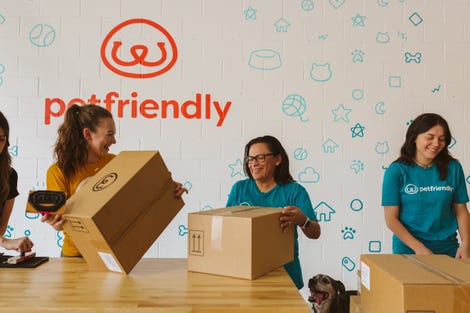
How do you build a subscription box business to rival major brands? PetFriendly, a startup that sells vet-quality flea & tick medication on a subscription model, has found success through personalization, pointing the way for other ecommerce startups to punch way above their weight.
The Omaha-based subscription pet care company has leapt to the head of a crowded pack with a business strategy that seems unorthodox in the post-Bezos fulfillment paradigm: utilize all the efficiencies of modern logistics while also giving customers a personalized experience. That personal element is critical, a competitive advantage that giants like Amazon were never built to compete with.
To understand why PetFriendly, which just closed a $6 million seed round, is such an important test case, consider how Amazon has reshaped ecommerce over the last decade. Since acquiring logistics automation pioneer Kiva Systems in 2012, Amazon has transformed order fulfillment from a clunky, cobbled-together process to a frankly jaw dropping display of automation-driven efficiency. Bezos made a bet that fulfillment speed was a huge pain point for customers, and he bet right. Big retailers and smaller companies were quickly left in the dust, and Amazon’s market share ballooned.
While undisputed, Amazon’s technological and operations dominance have been parried in the last few years by a thriving third-party logistics (3PL) sector that’s invested heavily in AI and automation. That means smaller retailers are now able to offer fast fulfillment via 3PLs that, if not quite as fast or seamless as Amazon, is pretty darn close.
That sounds great, but it doesn’t take an MBA to spot the problem nested within that strategy: Competing with Amazon, which sells just about everything, entirely on efficiency is always going to be a losing proposition, a lesson a lot of companies are currently learning the hard way. Is it the fate of ecommerce startups to fight for table scraps?
Enter PetFriendly. When CEO Aaron Shaddy and COO Ryan Finstad founded the company in 2018, they decided to do something unorthodox: They would build and control their own fulfillment operation from scratch rather than relying on the 3PL market. That may seem counterintuitive — after all, the logistics world in 2018 was abuzz with the idea that 3PLs might finally be nipping at Amazon’s heels. But Shaddy and Finstad had an insight that’s proven uniquely effective over the last three years. By controlling and building fulfillment from scratch, it’s possible to scale the efficiency gains of the last decade while also offering a new ingredient, one big retailers have been almost philosophically opposed to: personalization.

PetFriendly
“At the core of PetFriendly is the concept of ‘Scaling Delight’ – optimizing everything we do for both efficiency and personalization,” says Shaddy.
PetFriendly sells vet-quality flea and tick medicine via subscription, but Shaddy believes modern consumers expect more than just a widget in a brown box – they want to engage with brands who know their name and go out of their way to put a smile on their face. One example, every PetFriendly box has a unique photograph of the customer’s pet, which the customer uploads when signing up for the service. This would be a logistical nightmare for an existing fulfillment service to incorporate, and it’s a safe bet the idea would be rejected by a traditional operations executive. What happens if an order is returned, after all?
“We looked at turn-key ecommerce software like Shopify, but quickly realized it wouldn’t give us the flexibility we needed to deliver personalization,” says Alex Gates, Director of Engineering. “Building our systems from the ground up allowed us to integrate CRM, order processing, fulfillment, and customer service modules into one unified system deployed companywide.”
Technology has played a big role in PetFriendly’s fulfillment operation. Custom AI helps ensure that uploaded pet photos meet necessary criteria, such as identifying the correct species and not including any humans. The company utilizes custom computer code and a database that feeds details to the in-house fulfillment team – called “Boxers” – via tablets at each packout station in the warehouse. These innovations allow for efficient management of what would traditionally be a labor intensive process, and serve as a bridge between the company’s CRM and its fulfillment operation on the warehouse floor.
Whereas fulfillment staff at major ecommerce retailers have long been treated as components in a fulfillment machine and measured almost exclusively on order packing speed, PetFriendly Boxers are empowered to add their own flourishes and personal touches to the package. Tablets prompt Boxers with information, such as a customer’s anniversary, to build a connection between the Boxer and customer and call out milestones of note. One Boxer is an artist and even enjoys making a few personalized drawings for customers each week.
“Our boxer teams are incentivized to delight our customers, not just pack the most boxes per hour,” says COO Ryan Finstad.
These are relatively small touches in the scheme of things, but when added to a quality product delivered seamlessly they represent a completely innovative fulfillment approach, one that’s giving the startup a competitive advantage over the largest retailers in the world, including Chewy, the dominant player in the online pet space.
“While the shift to massive, globalized commerce has led to great efficiency and speed, it’s come at the cost of personal touch and human interaction. We founded PetFriendly on the premise that modern customers still crave a delightful experience, and we’ve built a foundation of systems and processes that allow us to deliver on that as we continue to rapidly scale the business,” says Shaddy.






